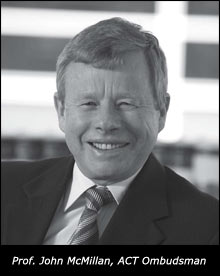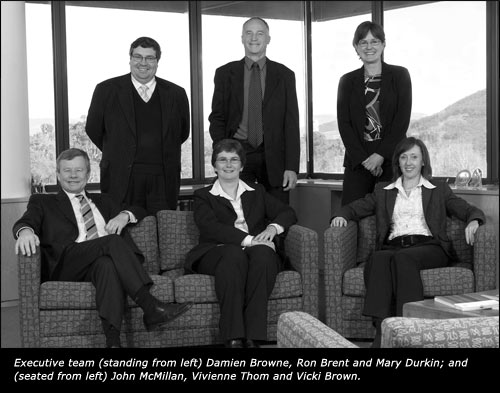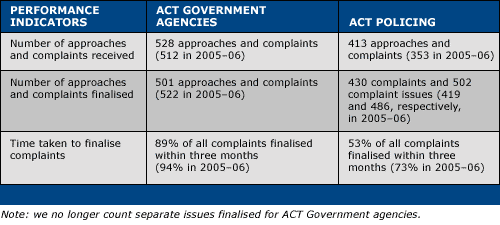Performance and financial management
Performance and financial management
Introduction
 The ACT Ombudsman’s office has been operating for 18 years. During that time we have assisted in resolving complaints from thousands of ACT residents about virtually all aspects of government administration. We bring 30 years of experience in dealing with complaints about Australian Government departments and agencies, through our Commonwealth Ombudsman role.
The ACT Ombudsman’s office has been operating for 18 years. During that time we have assisted in resolving complaints from thousands of ACT residents about virtually all aspects of government administration. We bring 30 years of experience in dealing with complaints about Australian Government departments and agencies, through our Commonwealth Ombudsman role.
The office consistently focuses on areas such as the quality of decision making, internal complaint handling, transparency, record keeping, communication with the public, sensitivity to individual needs, and government accountability generally.
By fostering improved government administration, we can strengthen the community’s confidence in the integrity and professionalism of government and support fairer and more accountable government.
The organisation
The Ombudsman is an independent statutory officer who considers complaints about the administrative actions of government departments and agencies, and aims to foster good public administration by recommending remedies and changes to agency decisions, policies and procedures. The Ombudsman also makes submissions to government on legislative and policy reform.
The role of the ACT Ombudsman is performed under the Ombudsman Act 1989 (ACT) (Ombudsman Act). The Ombudsman also has specific responsibilities under the Freedom of Information Act 1989 (ACT), and is authorised to deal with whistleblower complaints under the Public Interest Disclosure Act 1994 (ACT).
Complaints made about Australian Federal Police (AFP) officers acting in their ACT Policing role are dealt with by this office under our Commonwealth jurisdiction (Ombudsman Act 1976 (Cth)) and through an agreement with the ACT Government. Up until 30 December 2006 the Ombudsman had specific responsibilities in relation to complaints about the AFP under the Complaints (Australian Federal Police) Act 1981 (Cth) (Complaints Act). These responsibilities now fall under the Australian Federal Police Act 1979 (Cth) as well as the Ombudsman Act (Cth). These changes are discussed in detail later in the report.
The Ombudsman has a new role in monitoring compliance with chapter 4 of the Crimes (Child Sex Offenders) Act 2005 (ACT) (child sex offenders register) by the ACT Chief Police Officer and other people authorised by the Chief Police Officer to have access to the register.
The office investigates complaints in accordance with detailed written procedures, including relevant legislation, a service charter and a work practice manual. It carries out complaint investigations impartially, independently and in private. Complaints may be made by telephone, in person or in writing (by letter, email or facsimile, or by using the online complaint form on our website). Anonymous complaints may be accepted.
The key values of the Ombudsman are independence, impartiality, integrity, accessibility, professionalism and teamwork.
Overview
Complaint statistics
Complaint handling is the core of the ACT Ombudsman’s role. In 2006–07 the office received 941 approaches and complaints from the public about ACT Government agencies (528) and ACT Policing (413). This represents an increase of 9% on the 865 approaches and complaints we received in 2005–06. However, the figures are not directly comparable because of changes in the way ACT Policing complaints are handled.
The number of approaches and complaints received about ACT Government agencies increased by 3% in 2006–07 (528, compared to 512 in 2005–06). Housing ACT and ACT Corrective Services continue to be the agencies about which we receive most complaints.
During the period we finalised 931 approaches and complaints, with 501 being about ACT Government agencies and 430 about ACT Policing.
Detailed analysis of complaints received and finalised is provided in the ‘Analysis of agency performance’ part of this report in the sections Complaints—ACT Government agencies and Complaints—ACT Policing.
Submissions
A distinct role of the Ombudsman is to contribute to public discussion on administrative law and public administration, and to foster good public administration that is accountable, lawful, fair, transparent and responsive.
As part of this role we made submissions to, or commented on, a range of administrative practice matters, Cabinet submissions and legislative proposals during the year. These included:
- providing comments on the Planning and Development Bill 2006 to the ACT Legislative Assembly’s Standing Committee on Planning and Environment
- making a submission to the Department of Housing and Community Services on the exposure draft of the Children and Young People Bill 2007
- providing comments on draft amendments to the Ombudsman Act that were included in the Statute Law Amendment Act 2007.
Organisational planning and environment
During the year, the office’s strategic plan was reviewed to build on achievements over the past four years and to reflect priorities for the period 2007 to 2010. Strategic priorities identified for 2007–08 are to:
- focus on areas of administrative concern as identified through analysis of complaint trends
- continue to build the profile of the office through outreach, relevant publications and communication activities
- build on our work practices and system changes to deliver improved timeliness, efficiency and effectiveness in managing complaints, conducting inspections and generating reports
- improve quality assurance and consistency in complaint handling.
The office’s strategic plan informs its internal business plans. There are clear links between the objectives and the key measures of success of the strategic plan and the goals and directions set in the business plan for all teams and for staff members in their individual performance agreements. As a result, performance agreements are closely linked to business plans.
Highlights
This has been a year of both consolidation and change for the Ombudsman’s office.
Last year we introduced new work practices and a new complaint management system, and formed the Public Contact Team to be the initial point of contact for all complaints and enquiries to the office. These changes have now been fully implemented, and we are undertaking a review to determine whether they have delivered the improvements sought in our complaint-handling processes, and to identify areas for further improvement.
During 2006–07 we focused greater effort on making formal reports on investigations about ACT Government agencies than in previous years. This year we provided five reports on our investigations, with three of these under s 18 of the Ombudsman Act. Each report contained recommendations for improvement of processes within the relevant agencies. Summaries of the reports are provided later in the section Complaints—ACT Government agencies.
In addition, as discussed in the section Complaints—ACT Policing, changes have been made to the legislative regime governing the handling of complaints about the AFP. As a result, we have put extensive effort into developing new policies and procedures regarding AFP complaints.
Our expertise in public administration helps us to ensure that best administrative practice is integral to government planning and decision making. The office continued to provide input on significant ACT Government projects during the year, including the ACT Prison Project, and to hold regular meetings with agency contact officers.
Outlook for 2007–08
We continue to operate under a memorandum of understanding (MOU) with the ACT Government for the provision of Ombudsman services in relation to ACT Government agencies and ACT Policing. At the time of publication we are close to signing a new services agreement with the ACT Government, which takes into account complaint workloads for the office and developments in ACT functions, such as the new ACT Prison.
In 2006–07 we resumed our program of seminars for ACT Government complaint contact officers. The seminars aim to increase the practical complaint-handling skills of those officers, as well as enhancing their understanding of the role of policy and legislation in decision making. We will continue with this program in 2007–08.
Our capacity to deal with complaints in an effective and timely manner depends to a significant extent on our relationship and interaction with government agencies. We have conducted a number of surveys of people who have complained to us, in order to identify how we can improve our service delivery. However, we have not undertaken a systematic review of our interactions with agencies for many years.
During late 2006–07 we commenced a survey of agencies to ascertain their views about our effectiveness and our interactions, and to identify areas where we could improve processes to lead to speedier and more effective resolution of complaints. We will assess the survey results, and start implementing any required changes, early in 2007–08.
During 2007–08 we will also conduct another survey of people who have complained to us, to identify any areas for improvement in our policies and procedures.
In 2006–07 major reforms to the AFP complaint-handling system were implemented. These reforms remove the requirement for joint handling of all complaints. AFP line management deals with minor matters, providing a faster and more efficient method for resolving these issues. More serious matters will continue to be notified to the Ombudsman’s office, with primary responsibility for resolving these matters remaining with the AFP.
Ombudsman staff will continue to be active in ensuring that the AFP’s complaint-handling system provides an effective response to individual complainants and provides public assurance about police accountability.
In 2007–08 we expect that most complaints received under the Complaints Act will be finalised. This will enable the office to focus more on systemic and serious issues relating to AFP practices and the conduct of individual AFP members.
Finally, we will examine ways to improve the level of our engagement with the ACT community.
Internal Accountability
The Commonwealth Ombudsman is also the ACT Ombudsman in accordance with s 28 of the ACT Self-Government (Consequential Provisions) Act 1988 (Cth). Services are provided to the ACT Government under a memorandum of understanding. The Ombudsman’s office remains independent of the ACT Government.
The Governor-General of Australia appointed Prof. John McMillan as Commonwealth Ombudsman in May 2003 for a five-year period. The Ombudsman’s remuneration is determined in accordance with a ruling by the Remuneration Tribunal. Prof. McMillan acted in the position of Integrity Commissioner in the Australian Commission for Law Enforcement Integrity during the period January to June 2007. Dr Vivienne Thom, Deputy Commonwealth Ombudsman, acted in the position of Ombudsman during that period.
In 2006–07 the Ombudsman delegated day-to-day responsibility for operational matters for the ACT Ombudsman to Senior Assistant Ombudsman Ray Matcham, and later Senior Assistant Ombudsman Damien Browne, and responsibility for law enforcement, including ACT Policing, to Senior Assistant Ombudsman Vicki Brown. Both Senior Assistant Ombudsmen are supported by teams of specialist staff (the ACT Ombudsman Team for ACT Ombudsman functions and the Law Enforcement and Inspections Teams for law enforcement functions) in carrying out these responsibilities for the Ombudsman. The Ombudsman and Deputy Ombudsmen maintain an active involvement in the work of these teams.

Analysis of agency performance
Summary
In 2006–07 the ACT Government paid an unaudited total of $933,799 (including GST) to the Ombudsman’s office for the provision of Ombudsman services. Moneys were received directly from the ACT Government under the MOU. Payments (including GST) were for the purposes of the ACT Ombudsman function ($439,583) and the handling of complaints about ACT Policing ($494,216).
The office’s performance against indicators is shown in Table 1 and provided in more detail under the sections Complaints—ACT Government agencies and Complaints—ACT Policing. The statistical report in Appendix 1 provides details of approaches and complaints received and finalised, and remedies provided to complainants in 2006–07.
TABLE 1 Summary of achievements against performance indicators, 2006–07

The categories of approaches and complaints to the office range from simple contacts that can be resolved without investigation through to the formal use of the Ombudsman’s powers. Where a complaint involves complex or multiple issues, we conduct a more formal investigation. The decision to investigate a matter more formally can be made for a number of reasons:
- need to gain access to agency records
- nature of the allegations made by a complainant
- time taken by an agency to respond to our requests for information
- likely effect on other people of the issues raised by the complainant.
As well as handling complaints directly, the Ombudsman’s office plays a valuable role in referring people to the most appropriate agencies to deal with their concerns. Where people have an enquiry or complaint outside the Ombudsman’s authority, we try to provide relevant information and contact details to assist them.
In some instances, we refer complainants to other review agencies that can more appropriately deal with the issues they have raised. These issues may include complaints about environment, health and consumer services, as there are special commissioners to deal with these matters. We also receive approaches about matters that we are unable to consider because they are outside our jurisdiction, such as complaints about employment conditions. Approaches and complaints about actions of other police forces are referred to the relevant state ombudsman or other investigative body.
Training and liaison
The Ombudsman’s office attaches great importance to establishing a cooperative and respectful relationship with government agencies and community sector organisations. This is important in the effective and efficient conduct of our complaint investigation role.
Ombudsman staff participated in a number of formal and informal meetings and training sessions with ACT Government and other agencies.
Specific activities included:
- conducting a forum for ACT Government agencies’ contact officers and complaint handlers
- providing a briefing to Members of the ACT Legislative Assembly, ACT Senators and Members of Parliament, and their staff, on the role and function of the Ombudsman
- providing a briefing to the Executive of the Department of Education and Training
- providing an information session for trainee custodial service officers and probation and parole officers
- continuing to provide input to the Department of Justice and Community Safety on the ACT Prison Project
- participating in the ACT Free Legal Advice Forum and the Complaint Handlers Forum to discuss topical issues in complaint management
- conducting regular meetings with senior staff in ACT Government agencies to provide feedback on complaints received and to ensure complaints are handled smoothly
- commenting on a range of ACT Government and agency submissions and discussion papers raising issues of administrative practice
- meeting monthly with the AFP’s Professional Standards team to discuss issues relevant to the operation of the complaint-handling system, and meeting weekly with Professional Standards staff to discuss individual complaints and investigations
- attending a joint AFP-Ombudsman workshop on reforms to the AFP complaint-handling system
- co-sponsoring a three-year study entitled ‘Whistling while they work’ on whistleblower protection laws across Australia
- co-sponsoring a major project to improve management of difficult complainant behaviour.
We play an active role in collaborating with Ombudsman offices in the Asia-Pacific region. During 2006–07 the ACT Ombudsman Team hosted people from Vanuatu and Papua New Guinea (PNG) on three occasions to provide insight and assistance on complaint handling at the local government level, particularly in relation to complaints in the corrections context. ACT Corrective Services was gracious in providing opportunities for our international visitors to tour the correctional facilities in the ACT.
Our Law Enforcement Team continued to assist other integrity bodies from the Asia-Pacific region through presentations to, and training of, international delegations, particularly in discussing the key aspects of our relationship with the AFP. The team also hosted a range of international guests this year, including senior staff from the PNG Ombudsman Commission.
Service charter standards
We are committed to providing the best service possible. The ACT Ombudsman Service Charter is available on our website at www.ombudsman.act.gov.au. The charter outlines the service that can be expected from the office, ways to provide feedback and steps that can be taken if standards are not met. We will complete a review of our service charter standards in 2007–08.
Where a complainant disagrees with our conclusions and decision on a complaint, they may ask for the matter to be reviewed. A Deputy Ombudsman will consider the information provided and decide whether or not we will review our decision. The Deputy Ombudsman chairs the office’s internal review panel and allocates the request for review to a designated review officer who has not had prior involvement in the complaint. The review officer will consider whether the processes our staff followed were fair and adequate, and whether the conclusions reached were reasonable and properly explained to the complainant.
During the reporting period, we received and finalised 13 requests for reviews of our complaint handling. Seven review requests involved ACT Government agencies. The original decision was affirmed in five complaints, and in two cases, we are investigating further. Six review requests related to ACT Policing. The original decision was affirmed in five complaints. The outcome for the sixth complaint did not change, but we apologised to the complainant for not keeping them advised sufficiently of progress with their complaint, and for not providing as full an explanation of our conclusions as we should have.
Community grants/assistance/sponsorship
The ACT Ombudsman’s office did not provide any community grants, assistance or sponsorship during the reporting period.
Territory records
In accordance with the Territory Records Act 2002 (ACT), the ACT Ombudsman’s office ensures that:
- all ACT Ombudsman records are stored appropriately and securely
- relevant position profiles and duty statements reflect the records-management skills required by the Ombudsman’s office
- training is available for records management and general staff in record-keeping skills and responsibilities
- a controlled language system for the Ombudsman’s office has been developed and is used by staff
- the Ombudsman’s approved Records Disposal Schedule is implemented and monitored appropriately.
Schedule 3 of the Territory Records Act will come into operation on 1 July 2008 and will provide for public access to ACT records over 20 years old. Records held by the ACT Ombudsman’s office will be examined to identify any that are over 20 years old and to ensure that access will be available, consistent with the legislation.
